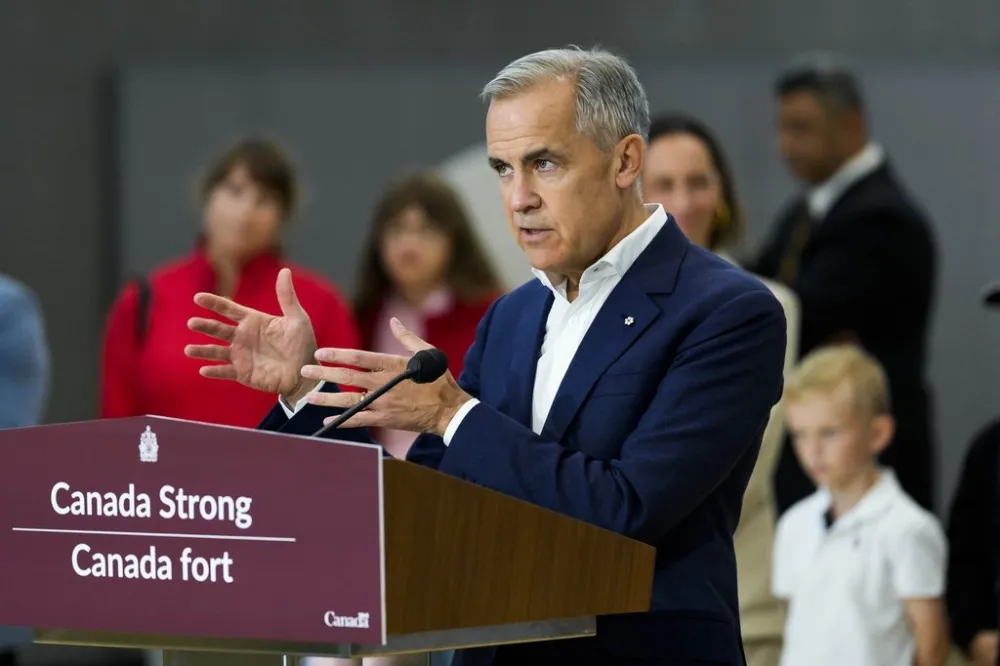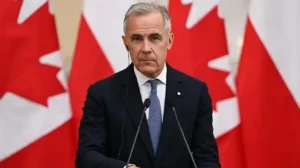Carney Unveils Automatic Tax Filing and Permanent School Food Program to Aid Low-Income Canadians

Ottawa, The Gulf Observer: Prime Minister Mark Carney announced on Friday a series of major social initiatives aimed at supporting low-income Canadians, including the launch of a long-awaited automatic tax filing system and the establishment of a permanent national school food program. The measures come ahead of a federal budget that Carney said will focus on protecting and empowering the country’s most vulnerable citizens.
Speaking in his home riding of Nepean, Ontario, Carney emphasized that the government would pursue “responsible and pragmatic choices” as it crafts the upcoming budget. “We will take pragmatic decisions so we can protect programs and initiatives that support the most vulnerable in our society,” he said. “We will build programs that help you get ahead.”
Automatic Tax Filing for Low-Income Canadians
The automatic tax filing system, first proposed by former Prime Minister Justin Trudeau’s government in 2020 and reaffirmed in the 2023 budget, will be rolled out starting in 2027. According to the Prime Minister’s Office (PMO), the system will initially cover about one million Canadians with simple tax situations, expanding to 2.5 million in 2028 and 5.5 million by 2029.
Carney noted that many low-income Canadians — particularly those on government assistance — fail to file annual tax returns because they do not expect to owe taxes. As a result, they often miss out on vital federal benefits such as the GST/HST credit, the Canada Child Benefit, the Canada Workers Benefit, and the Canadian Disability Benefit.
“A single parent with two young children earning $15,000 from a part-time job could be eligible for up to $25,000 in federal and provincial benefits,” Carney said, underscoring the impact of ensuring automatic access to these programs.
Opposition Reaction
Conservative House Leader Andrew Scheer criticized the timeline for the rollout, arguing that Canadians would be “terribly disappointed” by the pace of implementation. “Another four years to implement a five-year-old Liberal policy doesn’t look all that fast to me,” he said. Scheer also said Canadians are frustrated that the announcement did not include new measures for tax relief or inflation control.
Permanent National School Food Program
The Liberal government also confirmed that it will make the national school food program a permanent fixture. Introduced in 2024 with $1 billion in funding over five years, the initiative currently provides meals to more than 400,000 children annually, saving parents with two children about $800 a year.
“This is Canada. No child should go to school hungry or sit in a classroom all day wondering where their next meal will come from,” Carney said. “All our children should be focused on learning.”
The PMO said that beginning in the 2029–2030 fiscal year, the program will receive permanent annual funding of $216.6 million. The government also pledged to continue working with provinces, territories, and Indigenous partners to expand the program nationwide.
Canada Strong Pass Extension
Carney further announced that the Canada Strong Pass — a tourism initiative offering free or discounted access to national parks, museums, and rail travel — will be extended for the upcoming holiday season and again for summer 2026.
The pass, which was first introduced in 2025, provides free entry to Parks Canada sites, a 25 per cent discount on camping fees, free admission for children under 18 to national museums, and discounted VIA Rail travel for young adults.
The PMO said the pass boosted VIA Rail ridership by 13 per cent over the summer and increased visits to parks, museums, and historic sites by roughly 15 per cent on average.
Carney said the extension of the pass reflects the government’s commitment to “making Canadian heritage, nature, and culture accessible to all citizens while supporting domestic tourism.”


